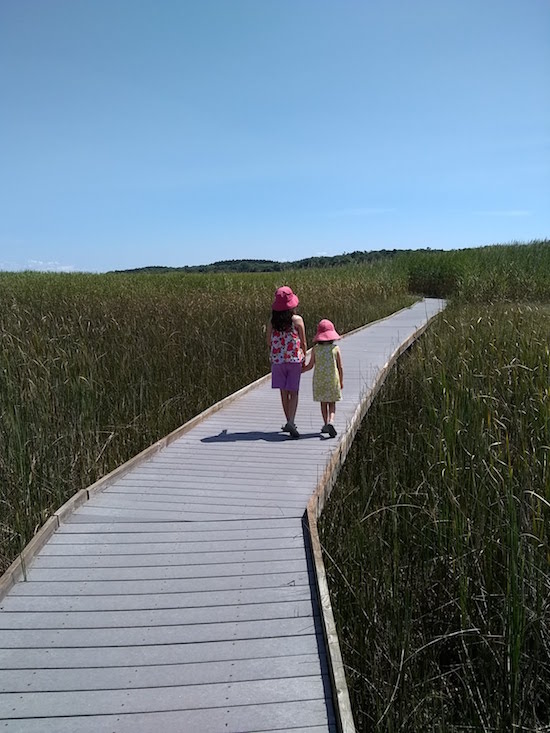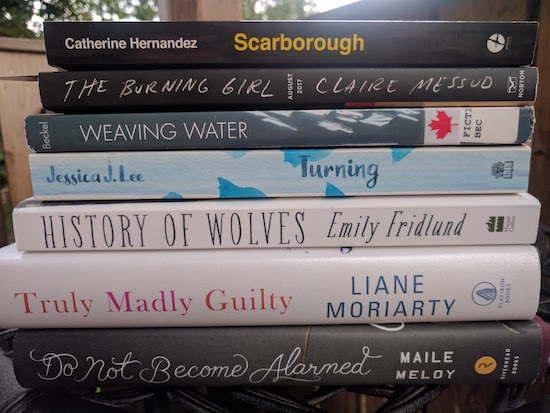May 28, 2019
New York is Magic
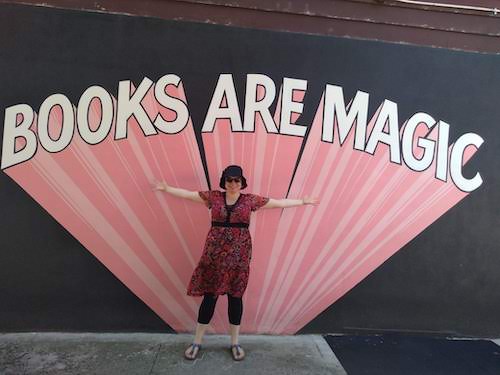
I’m having trouble finding my feet again after a weekend away where everything was extreme: hot, amazing, delicious, fun, expensive, tall, far, sunny, crowded, and wonderful. A record of our adventures can be had over at Instagram, where I will continue to post New York photos into the weekend because it was summer and beautiful there, and here it’s just cold and raining (again). I didn’t spend the entire weekend on bookish pilgrimages, because I want my family to continue to want to go on vacations with me in the future, but I did spend the whole weekend reading Madeleine L’Engle’s now-obscure 1982 novel for adults The Severed Wasp (blurbed by Norman Lear, no less!) which underlined my New York experience in terrific ways, even if the novel was like a soap opera set in a church community (and how come, between L’Engle and Barbara Pym, soap operas set in church communities are my favourite kind of book?). The book was why I wanted to see The Cathedral of St. John the Divine, which was not far from where we were staying, so we went there on Friday evening. Saturday we spent walking through Chelsea, just close enough to Greenwich Village that I was channelling my two patron saints, Grace Paley and Jane Jacobs—and while I wanted to go find Faith Darwin in a tree in Washington Square, we went to Union Square instead because it was closer to The Strand Bookstore, and I can’t expect my children to traipse across the entirety of New York City on my bookish whims, because New York is very big and also then my children would hate me.
Sunday’s allusions were more musical, as I went to Strawberry Fields in Central Park, a memorial to John Lennon, which was kind of the worst kind of circus, but I suppose that was the case with everything with the Beatles in the end. I was also excited to see The Dakota, not for John Lennon because I don’t like to be morbid, BUT because it was home two to amazing literary characters, Rosemary Woodhouse in Ira Levin’s Rosemary’s Baby (well, the film version, at least) and also Laine Cummings, Stacey McGill’s best friend in The Babysitters Club, which was how I learned about many places in New York in the first place. (I wonder if they ever met in the elevator?)
On Monday, we went to Brooklyn, because I wanted to visit Books Are Magic, which everybody in our family really liked for its great aesthetics, chilled out vibe, and good books selection, plus Stuart and Iris got to read stories and lie in the floor, which is always nice at the end of a busy four days of touristing. Which was still not enough to even get a proper sense of the city and all it holds, but it was a very good start, and now we all want to go back again.
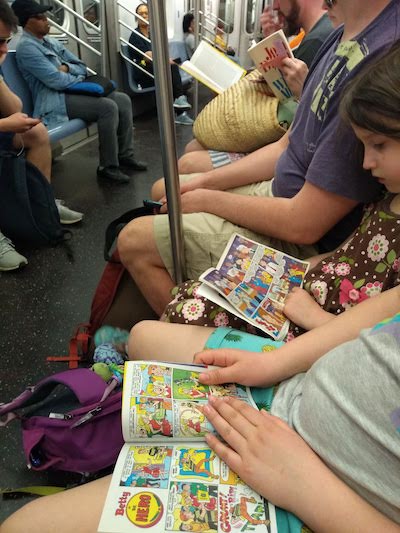
January 2, 2019
Happy New Year
No one got sick on our holiday—no pneumonia, or strep throat, and even the colds were fairly unspectacular. No one threw up on Christmas Eve, which is the first time ever that such a miracle has transpired in recent memory, and could be down to the fact that we ate bread and chicken noodle soup for dinner that night, because it had occurred to me that there could possibly be a correlation between the rich foods we eat every December 24 and the inevitable puking, although it’s embarrassing that it took me so many years to figure this out. With bread and broth, however, all the stomachs were settled, and it all has been a very low-key, relaxing, restorative and pleasant holiday.
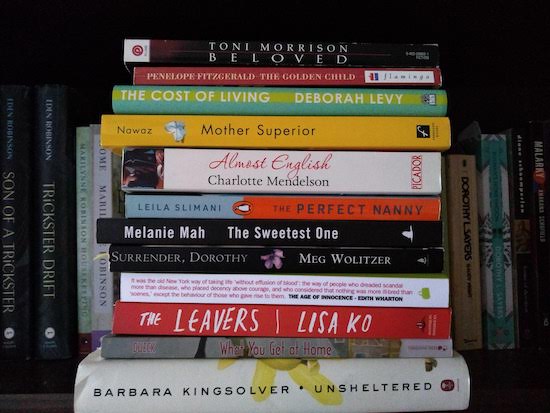
Mostly, I just read books, so many books, barrelling through titles on my To-Be-Read shelf, and also getting rid of other books that have been sitting there for years and that I’m never ever going to reading. True confession: the piles of books I had before me* have been overwhelming for quite some time, and reading should never feel that way. *These aren’t necessarily the books I’m sent by publishers, because I’m less responsible for these. Instead the ones that I’ve been picked up on my travels, and have not made enough time for. So I skipped the used book sales this fall, and made a point of reading the books I had this holiday, and now I feel much less likely to die in a book avalanche, which is an excellent way to start off the new year.
The downside to this, however, is that now I’m going to around telling everyone about this amazing novel called Beloved, by Toni Morrison, which only came out and won the Pulitzer Prize 30 years ago, so I’m really on the cutting edge, right? So hip and current. But oh my gosh, the book is extraordinary, and I can see how it ties right into the contemporary Black women writers whose work I’ve been loving these last few years. Another buzz worthy pick was The Age of Innocence, by Edith Wharton, which is not quite a new release, instead 97 years old, but I did get the spectacularly designed new edition from Gladstone Press, and it was gorgeous, and such a pleasure to read.
I also really loved Barbara Kingsolver’s Unsheltered, which I asked for for Christmas after reading this profile in The Guardian in October. It starts off kind of clumsily and didactic, more about ideas than being a novel proper, but the ideas were so interesting that I didn’t mind, and I also loved how well the two different storylines worked, that I was interested in both of them. And then partway through the book, the narrative grew legs, and I’ve been thinking about it steadily ever since I finished reading.
But I wasn’t only reading. And how can a person read this many books and not only be reading, you might ask? The answer being: I turned off my wifi for a week for my biannual holiday from the internet. It was glorious. I don’t have data on my phone anyway, so no wifi rendered me entirely internetless, and while I love the internet, since I’ve returned to it it’s only occurred to me that Twitter is wholly joyless, Facebook is pointless, and I like Instagram a lot still, but want to make our relationship more casual. And I want to focus on my blog instead, an online space that as ever is in transition. I’m going to be writing more about this in the coming weeks, about what blogs might be turning into. I’m not sure, but I think that for me, mine might be my online salvation. Stay tuned.
While I wasn’t reading, I was ice skating, checking out museums and galleries, playing card games—we got Rhino Hero for Christmas, and I love it with all my heart. I was knitting and delighting in Fargo Season 3 and watching Mary Poppins Comes Back, and going to for walks down residential streets and through ravines, and making turkey leftovers into all kinds of different things, and seeing friends, and even cousins (which I don’t have enough exposure to and which have always been my favourite part of Christmas), and also reading. Every day when I woke up, the first thing I did was turn on my bedside lamp and pick up my book, which is my very favourite way to start the day, and sometimes people even brought me tea.
And now it’s a new year, and my house is really tidy, after a marathon clear-out on Sunday (including a thorough pruning of my shelves to make space for the books I read on the holidays). I also have a new coat that doesn’t make me look like a hobo, and bought new bras, which was an errand that was three years overdue. Plus, I am currently in the midst of my ideal state of being, ie I am awaiting the arrival of a teapot in the post. What that I could be suspended in this reality forever, but when it ceases I will have the consolation of a teapot at least.
July 16, 2018
Summer Reading

When we arrived at our rental cottage up north last Saturday, I was surprised to feel troubled, because here we were in the most idyllic place imaginable on a glorious summer day, the beginning of a splendid week. But it was unease that I encountered—so slight but visceral—as I climbed the hill, took in the vista, and walked the paths I last walked almost a year ago. A few moments before it all clicked: it had been the books, of course. And also the weather—last summer the sky was always dark and brooding and there were storms every day. It was such an uneasy summer, climate-wise, and the books I’d brought along with me only complemented the atmosphere. It is possible that anyone would feel disturbed upon returning to the place where they’d read Emily Fridlund’s History of Wolves, I mean, or experienced the intensity of Liane Moriarty’s Truly, Madly, Guilty. Wilde Lake too, which was a modern take on To Kill a Mockingbird, but with more sinister undertones. Our last night there I started reading a Louise Penny novel and the weather in the opening chapter was identical to the thunder storm crashing outside our cabin window, and I began to wonder if the line between fiction and reality had become blurred. It really was intense, all of it, nine books in a week the definition of intensity anyway. So that when I arrived back there, it all came back, those incredible books I’d been so wrapped up in.

Last year’s summer reads.
It’s funny how books stay with you, and not always in the ways you’d expect. I really enjoyed Jessica J. Lee’s Turning: A Year in the Water last year at the cottage, but it wasn’t a book I expected to return to. I gave that book away in the spring, but when I jumped into the lake last week (over and over again) I realized what a mistake I’d made, that here was a book that had changed my life. I’ve been jumping into lakes and pools ever since I read it instead of easing my way in gently (and sloooowly) as in previous summers, thinking, “If Jessica J. Lee can use a hammer to crack the ice and jump in a lake in December, I’m certainly capable of a cannonball in July.” Back in the lake beside which I first read it, I realized how much this memoir needs a space in my book collection. How much all those books I read last summer had gotten under my skin.
I wasn’t sure how the reading was going to pan out this year—we were going on vacation with three other families, and while this was a very good plan, I was concerned that being surrounded on all sides by people I like might get in the way of my reading prowess. But it turned out not to be the case because, a) it turned out no one was interested in surrounding me on all sides 24 hours a day b) everyone else was reading too and c) our friends had brought their children, who whisked mine away for so much freedom, fun and adventure that I scarcely saw them all week long and therefore got to read so much that I almost go bored of reading. (Almost. I did, however, get bored of potato chips, shockingly, but that was only very temporary and things are back to normal.)
Anyway, it turns out that I read nine books again, and it was exhilarating and amazing. Liane Moriarty again, who does not get nearly enough credit for being a literary genius—the nuance and craft in her work is astounding. More Laura Lippman too, because she is just such an astounding novelist. The latest Birder Murder Mystery, A Tiding of Magpies, which was the first anti-Brexit novel I’ve read since Ali Smith’s Autumn (and it made me thinking about whether a good pro-Brexit novel was a literary impossibility). I really liked it, and also Death in a Darkening Mist, by Iona Whishaw, the third book I’ve read in the Lane Winslow mystery series which has really been a highlight of my summer. The new Caitlin Moran, which was so terrific, laugh-out-loud funny, powerful and profound. So glad to read Celeste Ng’s first novel after loving her latest a few months back. I was happy standing in line at Webers, because I had Tish Cohen’s Little Green in my bag, which was a certainly a novel that had me in its thrall. And Rumaan Alam’s That Kind of Mother still has me thinking about all the spaces in between its story and I think I’m haunted by the ending—such a subtly provocative book.
I wonder which of these will still be haunting me a year from now?
March 13, 2018
More Fun at English Bookshops
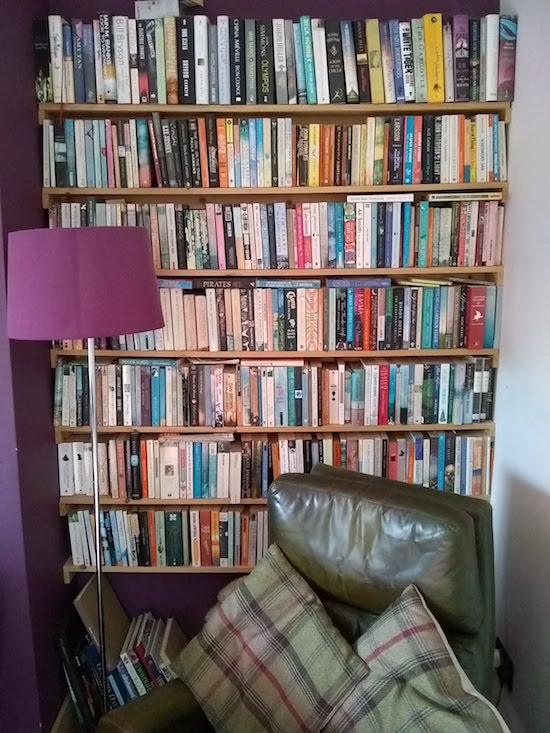
That we only visited three bookshops seems a bit paltry, although a little less so when you consider we were only in England for six days. My only regret is that this time we didn’t get to visit a bookshop on a boat where we were fed Victoria Sponge Cake, but perhaps that can only happen so often in a lifetime. Our trip to England was a little more local this time, focussed on Lancaster where we’d rented a house for a week. A house that came with a wall full of books, which seemed like a good omen—”But don’t let this make you think we don’t have to go to all the bookshops,” I reminded everybody.
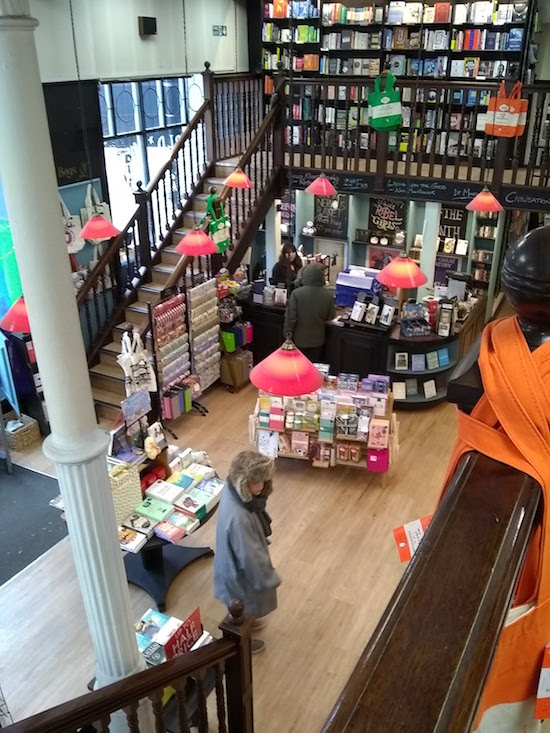 We’d actually visited our first bookshop before we even got to England, because I like the idea of travelling to England with no books, instead picking them up on my travels. Which is pretty risky, actually, considering the decimation of book selection at the Pearson International Airport where there are no longer actual bookshops, and instead a small display of books on display alongside bottles of Tylenol and electrical volt adapters. But I found a couple of titles that interested me, ultimately deciding on Anatomy of a Scandal, by Sarah Vaughan, the story of a political wife whose life comes apart when her husband is accused of rape. A timely book, and it was interesting, but spoiled for me by a “twist” that made this very fathomable story a little bit less so. Which meant that I was all too ready to buy another book at our first English bookshop, Waterstones in Lancaster.
We’d actually visited our first bookshop before we even got to England, because I like the idea of travelling to England with no books, instead picking them up on my travels. Which is pretty risky, actually, considering the decimation of book selection at the Pearson International Airport where there are no longer actual bookshops, and instead a small display of books on display alongside bottles of Tylenol and electrical volt adapters. But I found a couple of titles that interested me, ultimately deciding on Anatomy of a Scandal, by Sarah Vaughan, the story of a political wife whose life comes apart when her husband is accused of rape. A timely book, and it was interesting, but spoiled for me by a “twist” that made this very fathomable story a little bit less so. Which meant that I was all too ready to buy another book at our first English bookshop, Waterstones in Lancaster.
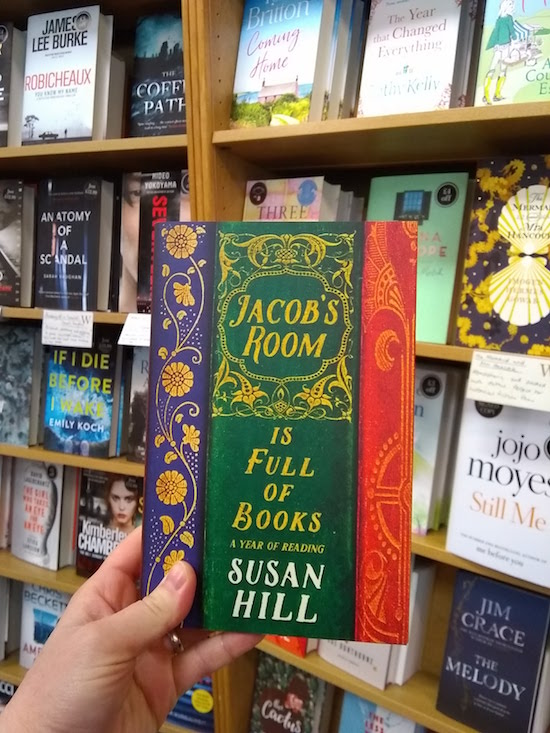
I love the Waterstones in Lancaster. My heart belongs to indie bookshops, but Waterstones is better than your average bookshop chain, and the Lancaster Waterstones in particular, which its gorgeous storefront that stretches along a city block. With big windows, great displays, little nooks and crannies and staircases leading to more places to explore. It’s a gorgeous store, with great kids’ displays too, and my children were immediately occupied by reading and also by a variety of small plush octopuses. I ended up getting Susan Hill’s Jacob’s Room is Full of Books, a follow-up to Howards End is on the Landing, which I bought when we were in England in 2009 and Harriet was a baby and I spent our week there reading it while she napped on my chest. Jacob’s Room… would turn out not to be as good as Howards End…, which broadened my literary world so much (and introduced me to Barbara Pym!). The new bookwas kind of rambling and disconnected and not enough about books, but was so inherently English that I was happy with it.
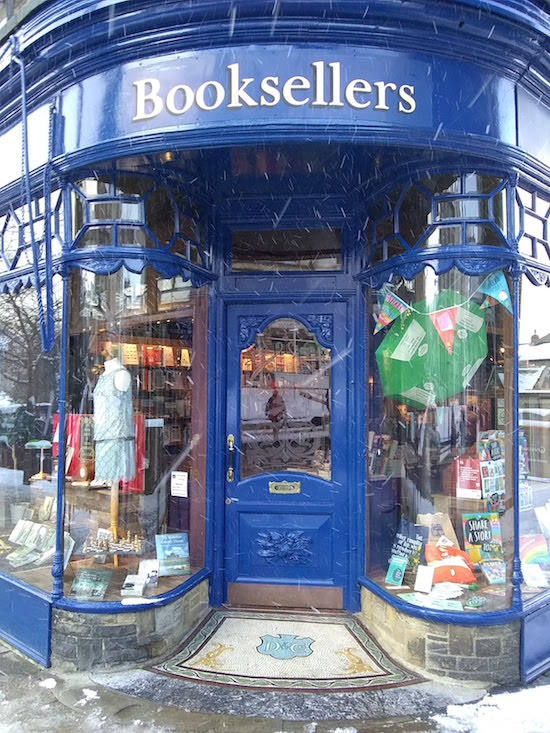
On the Wednesday we drove across the Pennines to Ilkley to visit The Grove Bookshop, which is one of my favourite bookshops ever. It’s located up the street from Betty’s Tea Room, which makes for one of the best neighbourhoods I’ve ever hung out in. After afternoon tea, where the children behaved impeccably, we took them to a toyshop for a small present as reward, which was good incentive for their behaviour in The Grove Bookshop too, where I was able to browse for as long as I liked. I love it there, the perfect bookshops and well worth a trip halfway across the world. I had been in the mood for a Muriel Spark novel since reading this wonderful article, and The Grove Bookshop delivered with The Ballad of Peckham Rye, a new edition in honour of Spark’s centenary. I was also very happy to find a rare copy of Adrian Mole: The Collected Poems, as Mole’s work has had a huge impact in my own development as an author and intellectual.
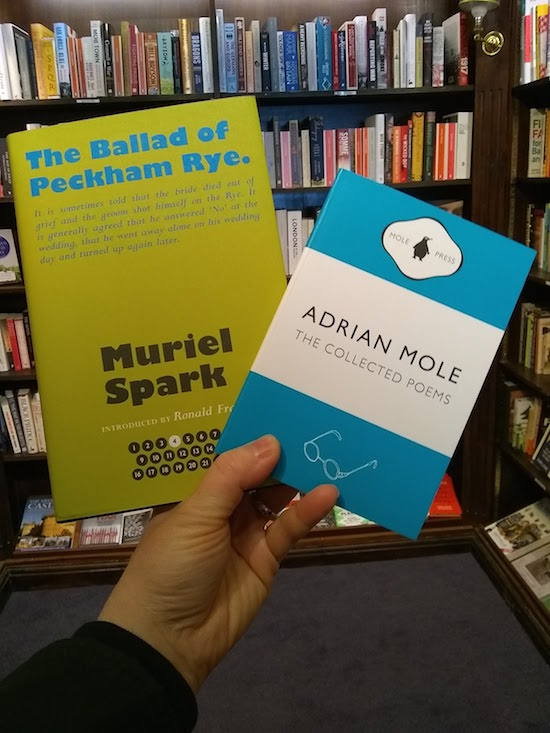
I really loved The Ballad of Peckham Rye, so weird and contemporary in its tone, strange and meta, the way all Spark’s work is. When we’re on vacation, I don’t like getting out of bed, lingering instead with a cup of tea and toast crumbs, and Peckham Rye was perfect for that,
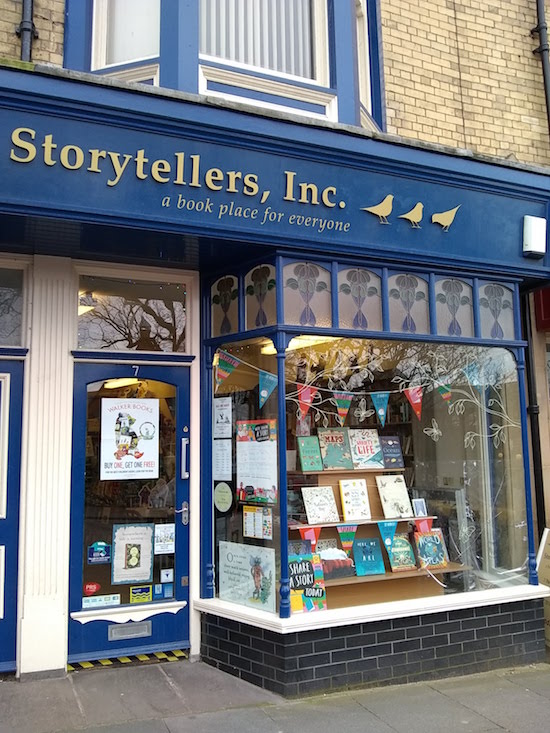
On Friday we went to Storytellers Inc, located in Lytham-St. Anne’s, just south of Blackpool. Originally a children’s bookshop, they’ve branched out to books for readers of all ages, although the children’s focus remains—they have a huge selection of kids’ books and a special kids-only reading room with a tiny door and kid-sized furniture. (Sadly, we’d not brought our kids along with us that afternoon and it would have been weird to go in there without them.) In addition to the kids’ books, they had lots of Canadian fiction, and poetry. We ended up buying Welcome to Lagos, by Chibundu Onuzo, just because we liked the cover. And also Motherhood, by Helen Simpson, because I’d seen it on the shop Instagram page, and then I saw that Emily was reading it.
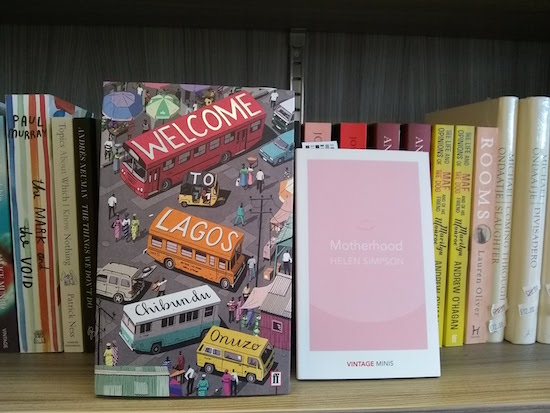
I don’t think I’ve ever read Simpson before, but this is a mini-collection of her stories from a few different books over the decades—and I loved it. Plus there was a boob on the cover. I finished reading it on the plane journey home, and then started Welcome to Lagos, which was really great. It’s Onuzo’s second novel, after the award-winning The Spider King’s Daughter. The latest is about a ragtag crew who arrives in Lagos and attempts to make a life there, in spite of the odds. They end up running in with a corrupt former Minister of Education with a suitcase full of money, and what they choose to do with this fate will make or break their destinies. In this case, choosing to buy a book for it’s cover was a very good decision.
March 6, 2018
We Went to England!

When I go on vacation, I usually like to put up a post and tell you so, to remind readers that there is indeed a human being behind this blog who sometimes needs a holiday, and also so I don’t leave you hanging (and having to head over to Instagram to find out just what I’ve been up to in the last five minutes). But about three weeks ago, I made the fatal error of noting that I hadn’t been ill or even really had a cold in ages and ages, which meant it was inevitable that I’d become sick a few days later. Three days before we were set to depart for a trip to England, I was in terrible shape and confined to my bed, and the prospect of an international flight seemed impossible. Fortunately two days in bed meant there had been some kind of recovery, in that I no longer felt like I’d been hit by a truck, but I had to lie down frequently on the way to the airport, and by the time we got there I’d developed a fabulous rash all over my face. So all this is to explain just why a review of Kim Fu’s The Lost Girls of Camp Forevermore has been hanging out here for ages. But then it’s such a terrific novel, maybe/definitely it deserved to be.
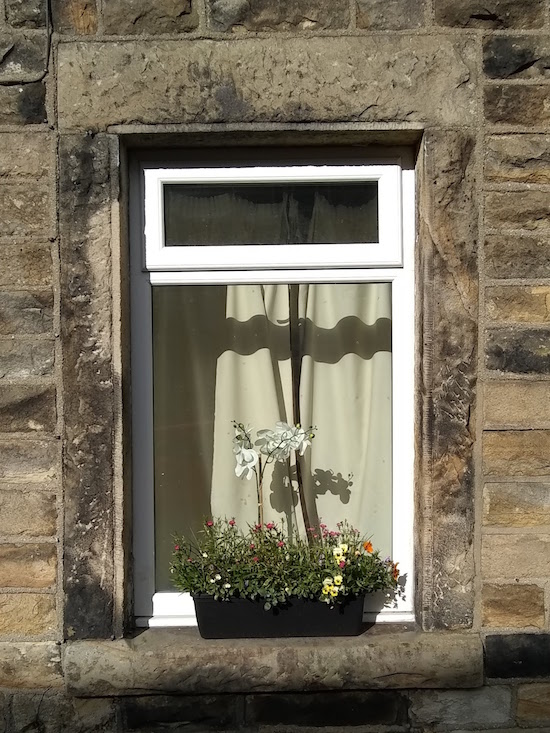
But the better part of the story is that we went to England! And losing an entire night of sleep left me so discombobulated that my body forgot I was sick and the rash mostly cleared up, and we were ready for all kinds of adventures that would not be deterred by the weather event titled, “The Beast from the East,” to be followed by the less-intimidatingly named “Storm Emma.” We were happy to be staying on the northwest coast, where the weather conditions were not so severe, and really just meant that everywhere we went we didn’t have to queue for things. Our AirBnB was in Lancaster, and it was fantastic—with an actual hot tub. And it was not so wintry on our first day there, where the sun was shining and there were flowers in the windows. We explored the city centre, happy to be in the company of Stuart’s mom and sister, and our tiredness mostly just had the effect of making us all laugh hysterically at stupid things. We hiked up to Williamson Park, which afforded beautiful views of the city, and delighted in the butterfly house and the animals in the zoo there, and then took turns on the zip line.
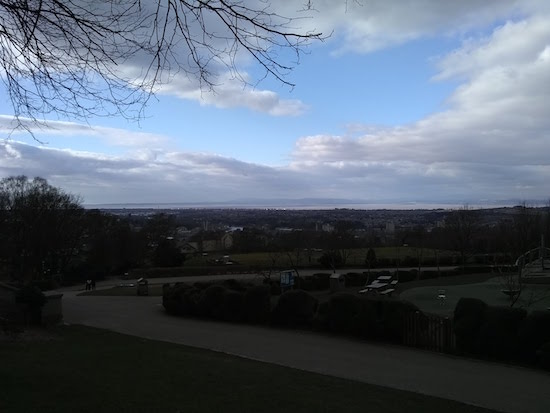
On Tuesday we drove (our amazing little Mercedes hire car!) to Stuart’s town by the sea, and had ice cream cones in frigid temperatures. We had our first experience looking for English beach glass, until the beach got too cold and we had to go in.
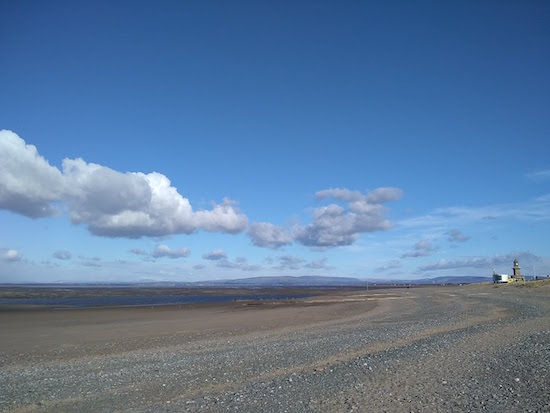
On Wednesday winter had arrived with a vengeance, and we took in the snow-covered hills of Yorkshire on our way to Ilkley, which is one of our favourite places in England, where we partook in afternoon tea at Betty’s and on the way home the kind people at the Pennine Service Station all worked together to figure out how to open our bonnet because we’d run out of windshield fluid.
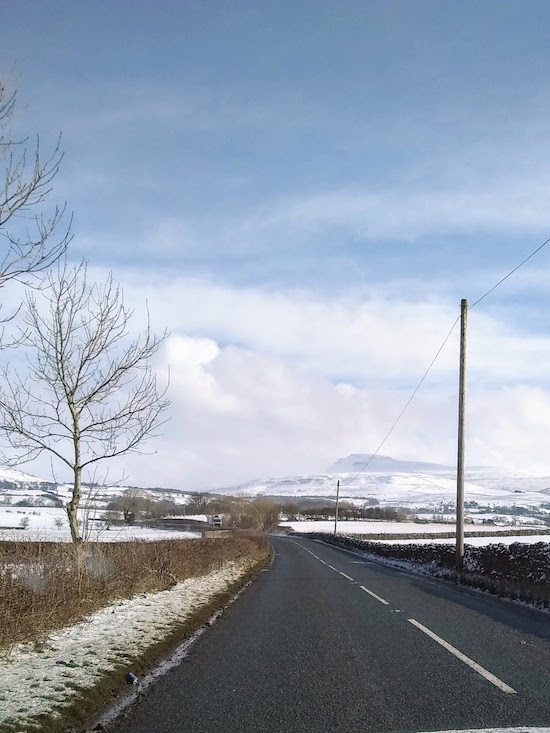
On Thursday, we all went to Bowness in the Lake District to see the Beatrix Potter Attraction and eat lamb shank in a pub, and we had the best scone of the week (we had many) at the Cornish Bakery there.
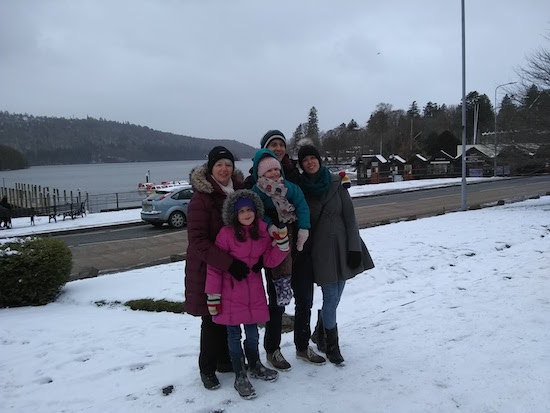
And on Friday we had another pub lunch (our children are confused and now thinks their auntie only has lunch in pubs) followed by delicious ice cream cones, and then Nana and Auntie Jen took the children to the Blackpool Sea Life Centre while Stuart and I went looking for bookshops. (More about the bookshops in a following post.) And then back to Stuart’s parents’ house for fish and chips, which were so delicious.
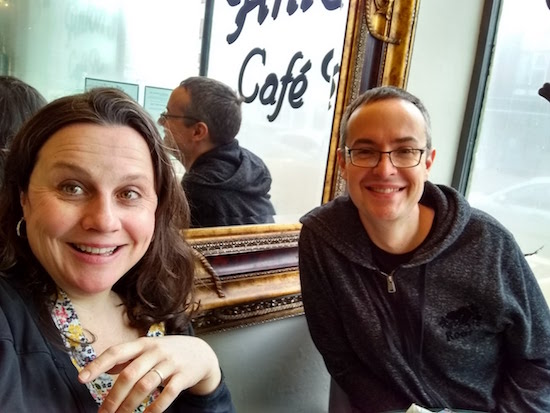
On Saturday, we went into the city centre for the Magic of Harry Potter Exhibit, and Harriet got to hold an owl whose variety was the British Little Owl, which is the cutest name ever. And then one more pub lunch with Auntie Jen—this time with a cheese board—and we really loved Lancaster so much. Then we drove back to Stuart’s parents’ down the narrowest road of our entire vacation (which is saying something) and I wasn’t even terrified. We spent our last afternoon there, and I got to read the Saturday Guardian (with all the supplements!) and then had a roast dinner before heading to Manchester for an airport hotel stop. And then getting up at 5:30 am (but they were already serving our continental breakfast and we got to have it!) and heading to the airport for the long trip home, via Amsterdam, where we had the most delicious lunch in an airport ever, and then I spent $17 on cheese.
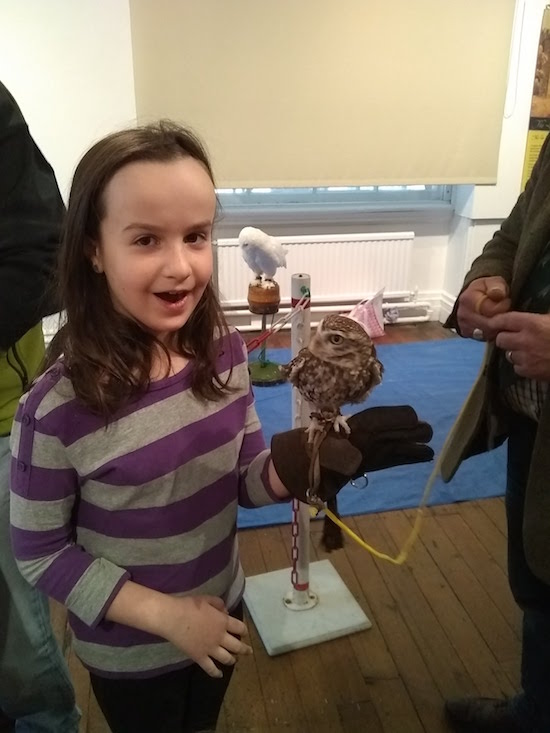
It was a wonderful week, so good to see our family, discover new places, and eat delicious things. And now we’re back and getting over the jet lag, and happy to settling into ordinary life again, and to be reminded that ordinary life is pretty darn nice.
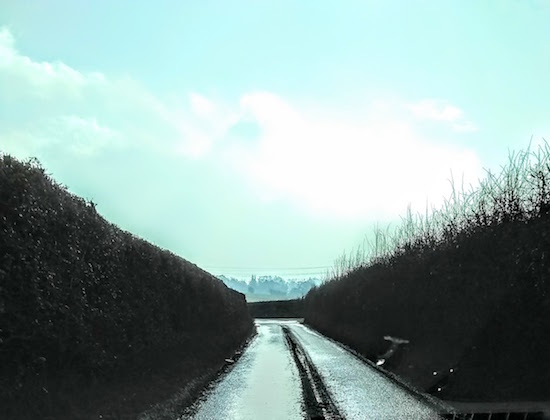
October 2, 2017
Pickle Me This goes to Edmonton

I lost my umbrella when I was in Edmonton, possibly in a bookshop, or somewhere en-route to the Hotel MacDonald, where I got to have fancy drinks with writer and blogger extraordinaire Shawna Lemay. So does that make it a literary lost umbrella, I wonder, even if it didn’t happen in fiction? Although I include the umbrella Virginia Woolf lost on a bus, and that wasn’t fiction either. Does it still count as a literary lost umbrella if it’s pocket-sized? Pocket-sized umbrellas just don’t seem all that literary. But they are particularly easy to lose.

Umbrella losses aside, however, as well as a minor mishap where I drank too much tea and managed to poison myself and spent an afternoon in bed in my hotel room, I had a wonderful time in Edmonton. (This was about two weeks ago. I’m a bit behind, blog-wise, and working hard on catching up.) I was invited for the Book Publishers Association of Alberta’s Annual Conference to give a presentation about why book blogs matter, and arrived in Edmonton on Thursday afternoon on a plane packed with women who were heading to some weird multi-level marketing conference for beauty products and obviously tried to convert me into their cult. (“Are you looking for your Plan B?” the woman sitting next to me on the plane was asking, and I’d never before considered how awful it would be to be trapped on a plane with people who were trying to convert you into their cult. I am still disappointed that I never thought to answer, “Are you peddling beauty products, sister? Cuz I don’t need no beauty products.”)

I had half a day to spend in a city I didn’t know yet, which is the most incredible kind of luxury, I think, in terms of time and opportunity. After finding my novel for sale in the airport bookshop (where the booksellers had even heard of it, or at least were very convincing in pretending they had…) a taxi delivered me to Whyte Avenue where I poked in shops and hung out in a Second Cup to charge my phone, and then I started walking, taking in the golden light in this place where Autumn comes earlier than it does where I live. Edmonton is beautiful, and it was a gorgeous, crisp fall day, and I had a very good time exploring on my own, making lines on a map that was new to me. When I reached the edge of the river valley, I was able to take in a great deal of the city at once, and it was gorgeous. I stopped at the High Level Diner for dinner, and it just happened to be Ukrainian night, so I got to have pirogies and borscht. And then I began my long long walk across the High Level Bridge with great dramatic clouds rolling in (see my first photo, above) and at this point I was pleased that I still had an umbrella.

As visiting bookstores is basically the reason I go anywhere, a trip to Audreys was the thing I most wanted to do in Edmonton, and it lived up to my amazing expectations. Although I must admit I’m partial to Audreys after my book was an Edmonton bestseller in April, and it was also pretty splendid to see it on the Staff Picks shelf. But even without these glorious details, I would have been happy to spend time browsing in Audreys, where I managed to find perfect gifts for each member of my family, and I bought Jen Powley’s memoir Just Jen and Claire Kelly’s debut poetry collection, Maunder, both of which would turn out to be very good choices.

Shawna met me at the bookstore, and then we went out for drinks, and had a delightful time. We’d met briefly at Shawna’s book launch in Toronto awhile back, but not exactly properly. However she is one of those bloggers that gives you the impression—with her candour, generosity, eloquence, thoughtfulness—that you know her. And I think I really did, because we had a terrific time together, never running out of things to talk about, and I could have talked forever, except that it was getting late and I was operating after a day of travel (planes and walking) and a two hour time difference. Luckily we got to keep on talking as Shawna kindly drove me to my hotel.

I saw the sun come up the next morning—I woke up at six so I could call my children before they headed off to school. There is nothing in the world quite like a prairie sky. And then I ordered room service and read books, and prepared for my presentation later that morning, which went very well, and it was so terrific to meet people in the Canadian book world with whom I communicate often and/or have been familiar with for years. I take for granted sometimes Canada’s hugeness, and that there are also these people I’ll never have the chance to meet face-to-face and then I do meet them and realize how powerful it is to bring people together and how much our culture benefits from these true connections being made. I loved Saskatchewan poet Brenda Schmidt‘s presentation about how social media has become her workbook—I identified so completely. And it was especially nice to be there to celebrate Alberta Books when I’ve been especially fond of them lately—Annie Muktuk and Other Stories and What Is Going to Happen Next are two stand-outs. It was a privilege to be part of it all, and hanging out in Edmonton. 
August 27, 2017
All Time Record
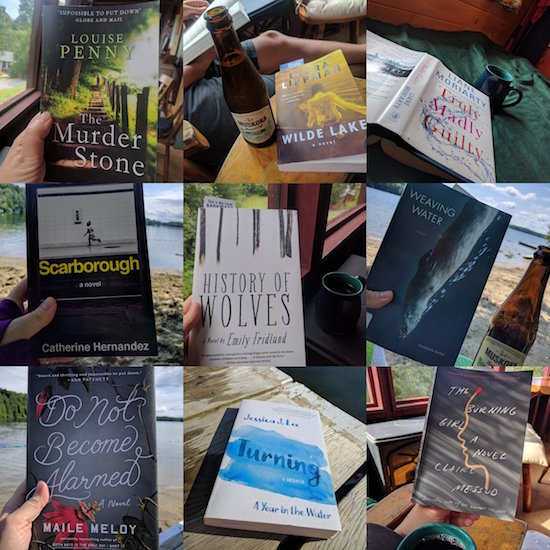
I made a very uncharacteristic vow a few months ago to only bring a couple of books on vacation, and not be so maniacally compelled to be always reading. Because I remember feeling pressure to read on previous vacations, which is stupid for a vacation and also made me anti-social…and then I ended up bringing seven books on vacation, plus a few extras, for Stuart to read and for just-in-case scenarios. But I decided I didn’t have to finish them all during our week at the lake. What better way to retain that holiday feeling than to let the holiday reading continue over into the week we’re back home, I thought. There was no pressure. I was going away with a towering stack, but I didn’t have to read all of them.
But then I did! Without being anti-social, even, because I also swam in the lake, played UNO and charades and Old Maid and Zingo. But on top of this, I lingered in bed in the mornings, read by flashlight at night after everyone was asleep, and got lots of reading in while the children were out chasing frogs, treasure hunting, or partaking in nighttime movies every evening at 7pm in the rec hall. There was time enough for all the reading, but also for all the other things. The days were so perfectly elastic, the way summer days are meant to be.
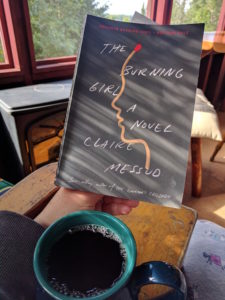 There was no rhyme nor reason to my stack of holiday books, except for the first, which was The Burning Girl, by Claire Messud, because I had to get it read for work reasons. But it turned out to be perfect, because it was such a summer book, steeped in atmosphere and there was a quarry and everything. Such a strange, skewed book too though, like everything Messud writes. It’s a look back on a friendship between two girls which breaks off at the point in which girlhood breaks off into womanhood, and the whole story delivered with this spectacular dose of nostalgia—except the main events of the narrative are just two years before and the narrator is still a teenager. I wasn’t expecting that, and it was kind of disorienting, this idea of the 1990s being something that happened “before I was born.” I’m used to young protagonists being set in the past. It was interesting. And she was such an interesting protagonist too, elusive and tricky in the way of Messud’s from The Women Upstairs. (Remember the furor from that book, about women and likability, and then Jennifer Weiner got involved?) This book is more subtle though, so much so that it needs an additional read to puzzle out its construction. The “Bev Burnes” character continues to haunt me, with her ample backside. And yes, the quarry. It would turn out that nearly all my holiday books would take place around bodies of water. Isn’t it funny the way that a syllabus assumes itself?
There was no rhyme nor reason to my stack of holiday books, except for the first, which was The Burning Girl, by Claire Messud, because I had to get it read for work reasons. But it turned out to be perfect, because it was such a summer book, steeped in atmosphere and there was a quarry and everything. Such a strange, skewed book too though, like everything Messud writes. It’s a look back on a friendship between two girls which breaks off at the point in which girlhood breaks off into womanhood, and the whole story delivered with this spectacular dose of nostalgia—except the main events of the narrative are just two years before and the narrator is still a teenager. I wasn’t expecting that, and it was kind of disorienting, this idea of the 1990s being something that happened “before I was born.” I’m used to young protagonists being set in the past. It was interesting. And she was such an interesting protagonist too, elusive and tricky in the way of Messud’s from The Women Upstairs. (Remember the furor from that book, about women and likability, and then Jennifer Weiner got involved?) This book is more subtle though, so much so that it needs an additional read to puzzle out its construction. The “Bev Burnes” character continues to haunt me, with her ample backside. And yes, the quarry. It would turn out that nearly all my holiday books would take place around bodies of water. Isn’t it funny the way that a syllabus assumes itself?
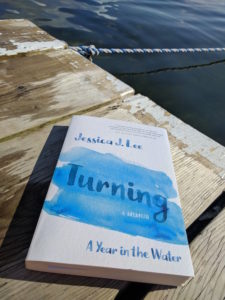 From this point on my reading also became a fun celebration of all the bookshops I’ve been visiting this spring and summer. I picked up Turning, by Jessica J. Lee at Curiosity House Books when we were in Creemore in June, a book I was partial to for #SwimLit reasons and also because of Lindsay’s review at her swimming hole blog. Once again, a book focussed on a body of water, or in this case many of them—although this time I’d seen it coming. The memoir is Lee’s story of her lifelong complicated relationship with swimming and water, and also with notions of identity and home, and about how she got over a bout of heartache and depression by spending a year swimming in lakes near her home in Berlin. A year indeed, which means Lee swims in all kinds of weather, in the deepest winter with a hammer to break the ice, and in the winter she never swims for too long. Although apparently the more you winter swim, your body grows accustomed to lower temperatures—though I’m going to just take her word for it. (I must say that Lee inspired me to jump into the lake wholeheartedly every day and not be a slow entering ninny. If she can swim in December, I can just in during August.) I liked the book a lot, and found it strange and disorienting in a fascinating way, the way a foreign city first appears, kind of. It was unusual to be reading about Germany and Berlin because all my frames of reference for swimming are so Canadian and English—it occurs to me that I know nothing about German geography at all, and little more about its literature. There is so much still to be immersed it, but Lee’s memoir was a memorable dip.
From this point on my reading also became a fun celebration of all the bookshops I’ve been visiting this spring and summer. I picked up Turning, by Jessica J. Lee at Curiosity House Books when we were in Creemore in June, a book I was partial to for #SwimLit reasons and also because of Lindsay’s review at her swimming hole blog. Once again, a book focussed on a body of water, or in this case many of them—although this time I’d seen it coming. The memoir is Lee’s story of her lifelong complicated relationship with swimming and water, and also with notions of identity and home, and about how she got over a bout of heartache and depression by spending a year swimming in lakes near her home in Berlin. A year indeed, which means Lee swims in all kinds of weather, in the deepest winter with a hammer to break the ice, and in the winter she never swims for too long. Although apparently the more you winter swim, your body grows accustomed to lower temperatures—though I’m going to just take her word for it. (I must say that Lee inspired me to jump into the lake wholeheartedly every day and not be a slow entering ninny. If she can swim in December, I can just in during August.) I liked the book a lot, and found it strange and disorienting in a fascinating way, the way a foreign city first appears, kind of. It was unusual to be reading about Germany and Berlin because all my frames of reference for swimming are so Canadian and English—it occurs to me that I know nothing about German geography at all, and little more about its literature. There is so much still to be immersed it, but Lee’s memoir was a memorable dip.
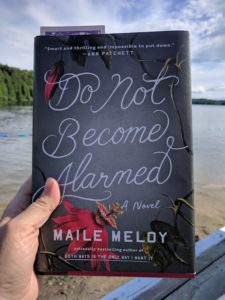 Next I read Do Not Become Alarmed, by Maile Maloy (also from Curiosity House Books in Creemore), whom I’d never read before, but I purchased the novel after reading Ann Patchett’s endorsement. In her back-of-the-book blurb, Patchett writes that this is the kind of novel you will barrel through and then should go back and re-read to realize how technically brilliant it is. Not quite sure I’ll be doing the latter, but this is a 300+page book that I read in less than a day. Also about a body of water, this one being an alligator-infested river in Panama in which a group of American children are floating in inner-tubes when they drift away from their errant parents. The American children are on a cruise with their families and they’ve just embarked from an excursion, and it’s all gone a bit wrong, and it’s only going to get worse. The story is indeed fast-paced and enthralling, and there were a few moments where the prose and what was happening took my breath away. This is a book about privilege, naivety, stupidity, and the ways in which Americans (and their ilk—hi! [waves]) are able to go about their lives protected from the risks and dangers that are commonplace in so many other countries.
Next I read Do Not Become Alarmed, by Maile Maloy (also from Curiosity House Books in Creemore), whom I’d never read before, but I purchased the novel after reading Ann Patchett’s endorsement. In her back-of-the-book blurb, Patchett writes that this is the kind of novel you will barrel through and then should go back and re-read to realize how technically brilliant it is. Not quite sure I’ll be doing the latter, but this is a 300+page book that I read in less than a day. Also about a body of water, this one being an alligator-infested river in Panama in which a group of American children are floating in inner-tubes when they drift away from their errant parents. The American children are on a cruise with their families and they’ve just embarked from an excursion, and it’s all gone a bit wrong, and it’s only going to get worse. The story is indeed fast-paced and enthralling, and there were a few moments where the prose and what was happening took my breath away. This is a book about privilege, naivety, stupidity, and the ways in which Americans (and their ilk—hi! [waves]) are able to go about their lives protected from the risks and dangers that are commonplace in so many other countries.
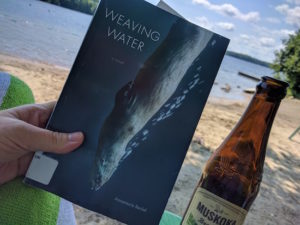 Next up was Weaving Water, by Annamarie Beckel, which was a book I’d been interested in for Annie Dillard Tinker Creek reasons, and then picked up to read after I met Annamarie at the Lakefield Literary Festival. In this book, the body of water in question is a pond in Newfoundland—and the novel points out that “ponds” in Newfoundland can often be the size of large lakes. On the banks of the pond is an old cabin that belonged to Beth Meyer’s husband’s great-aunt, who left it to them after she died. An ecologist by training and on the cusp of a new stage in life now that her daughter has gone away to school, Beth moves out to the remote cabin to do research on river otters, looking for answers to save an earth in peril. She meets her eccentric neighbour with an unshakable belief in ghosts and magic, and her neighbour’s nephew who Beth is drawn to in spite of herself. It turns out the answers Beth is looking for are not just about river otters after all, but the creatures remain at the centre of the novel and Beckel’s wonder at their habits and mysteries are absolutely palpable.
Next up was Weaving Water, by Annamarie Beckel, which was a book I’d been interested in for Annie Dillard Tinker Creek reasons, and then picked up to read after I met Annamarie at the Lakefield Literary Festival. In this book, the body of water in question is a pond in Newfoundland—and the novel points out that “ponds” in Newfoundland can often be the size of large lakes. On the banks of the pond is an old cabin that belonged to Beth Meyer’s husband’s great-aunt, who left it to them after she died. An ecologist by training and on the cusp of a new stage in life now that her daughter has gone away to school, Beth moves out to the remote cabin to do research on river otters, looking for answers to save an earth in peril. She meets her eccentric neighbour with an unshakable belief in ghosts and magic, and her neighbour’s nephew who Beth is drawn to in spite of herself. It turns out the answers Beth is looking for are not just about river otters after all, but the creatures remain at the centre of the novel and Beckel’s wonder at their habits and mysteries are absolutely palpable.
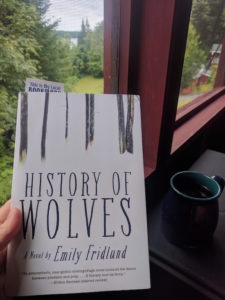 It took me a while to know that Emily Fridlund’s A History of Wolves (which I bought at Lighthouse Books in Brighton the weekend we were camping) would really work. There’s something off-putting about it, and it takes time to realize that that off-puttingness is part of its very design. Ostensibly, it fits right in with all the other books, with the body of water even—the lake the narrator lives on with her parents at their abandoned commune, isolated in the woods of northern Minnesota. But then a couple moves into a new cabin across the lake, and she can watches them through their windows, and begins to care for their young son. And she’s drawn to the family in a way that’s connected with a former teacher who was eventually charged with possession of child p*rnography, and a classmate who’d been connected to him. How do all the pieces fit together? To be honest, I’m still not entirely sure and it’s the kind of book I should return to and I’m even compelled to, but am not sure I will. Because of the off-puttingness, a narrator who never really connects to anyone. Again, which is the point, and there’s a killer last line that underlines this point. I ended up really appreciating this book, though I can’t say I liked it. But in the end, it was a perfect fit with all the rest, the splash of the paddle from Linda’s canoe as she makes her way across the lake.
It took me a while to know that Emily Fridlund’s A History of Wolves (which I bought at Lighthouse Books in Brighton the weekend we were camping) would really work. There’s something off-putting about it, and it takes time to realize that that off-puttingness is part of its very design. Ostensibly, it fits right in with all the other books, with the body of water even—the lake the narrator lives on with her parents at their abandoned commune, isolated in the woods of northern Minnesota. But then a couple moves into a new cabin across the lake, and she can watches them through their windows, and begins to care for their young son. And she’s drawn to the family in a way that’s connected with a former teacher who was eventually charged with possession of child p*rnography, and a classmate who’d been connected to him. How do all the pieces fit together? To be honest, I’m still not entirely sure and it’s the kind of book I should return to and I’m even compelled to, but am not sure I will. Because of the off-puttingness, a narrator who never really connects to anyone. Again, which is the point, and there’s a killer last line that underlines this point. I ended up really appreciating this book, though I can’t say I liked it. But in the end, it was a perfect fit with all the rest, the splash of the paddle from Linda’s canoe as she makes her way across the lake.
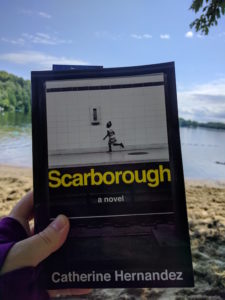 I wasn’t sure how Scarborough, by Catherine Hernandez (which I bought on our trip to Mabel’s Fables a few weeks back), would fit in with all the rest, a book that is so urban. But then it turned out to have its own body of water, the Rouge River, and the book opens with a heron at the river’s mouth, and it moves through the seasons in the same way Lee’s Turning did. I loved this novel, which had been recommended by loads of people and which I read in less than a day. At the centre of the story is a drop-in centre at a Scarborough elementary school where families turn up for company, support…and breakfast. We see the program coordinator’s communications with her supervisor and the way that bureaucratic requirements (and racism) keep the program from properly serving the people it’s meant to. There are failings and there is tragedy, but there is also resilience and connection. Scarborough has just been nominated for a Toronto Book Award and I’m thrilled about that.
I wasn’t sure how Scarborough, by Catherine Hernandez (which I bought on our trip to Mabel’s Fables a few weeks back), would fit in with all the rest, a book that is so urban. But then it turned out to have its own body of water, the Rouge River, and the book opens with a heron at the river’s mouth, and it moves through the seasons in the same way Lee’s Turning did. I loved this novel, which had been recommended by loads of people and which I read in less than a day. At the centre of the story is a drop-in centre at a Scarborough elementary school where families turn up for company, support…and breakfast. We see the program coordinator’s communications with her supervisor and the way that bureaucratic requirements (and racism) keep the program from properly serving the people it’s meant to. There are failings and there is tragedy, but there is also resilience and connection. Scarborough has just been nominated for a Toronto Book Award and I’m thrilled about that.
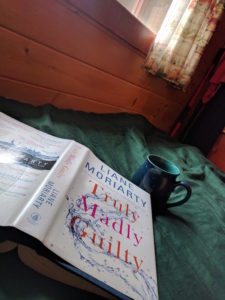 Next up was Lianne Moriarty’s Truly Madly Guilty, which I bought at Beggar’s Banquet Books in Gananoque when I was there in early May. I loved her Big Little Lies back in March, and remember hearing about this one when it came out last year but then didn’t read it after coming across a dismissive review—I think there was a big reveal that was meant to be anti-climatic in the end. But I’m so glad I finally picked it up. Moriarty is brilliant, and will never get the literary credit she deserves for sexist reasons. Indeed, this is a novel that revolves around a mystery—something happened at a bbq and the novel moves between the perspectives of different characters reflecting on the events leading up to it. At the centre of the book is two friends, Clementine and Erica, friends since childhood with a complicated dynamic. And Moriarty gets it so perfectly, the way that a friendship can come with ambivalence and animosity, and she ties it to the women’s marriages and their relationships to their mothers. The reviewer is correct that the big reveal is less than we’ve been lead to believe it’s going to be—but it doesn’t matter because the point of the book turns out to be so much bigger than what happened one night. And that’s what’s so fantastic about it, the hugeness of this novel’s scope—this event of one night ends up connecting to stories that are decades old and to characters far-flung and nearby. It reminded me of The Slap, by Christian Tsiolkas, but without the violence and misogyny. Moriarty manages to show every single character at their worst, but redeem them too in a way that’s entirely believable. And now I want to read every single thing she’s ever written. (PS: this was the one that didn’t quite click with all the others, but then there ended up being a body of water after all, which was a very tacky backyard fountain that meets with a sorry end.)
Next up was Lianne Moriarty’s Truly Madly Guilty, which I bought at Beggar’s Banquet Books in Gananoque when I was there in early May. I loved her Big Little Lies back in March, and remember hearing about this one when it came out last year but then didn’t read it after coming across a dismissive review—I think there was a big reveal that was meant to be anti-climatic in the end. But I’m so glad I finally picked it up. Moriarty is brilliant, and will never get the literary credit she deserves for sexist reasons. Indeed, this is a novel that revolves around a mystery—something happened at a bbq and the novel moves between the perspectives of different characters reflecting on the events leading up to it. At the centre of the book is two friends, Clementine and Erica, friends since childhood with a complicated dynamic. And Moriarty gets it so perfectly, the way that a friendship can come with ambivalence and animosity, and she ties it to the women’s marriages and their relationships to their mothers. The reviewer is correct that the big reveal is less than we’ve been lead to believe it’s going to be—but it doesn’t matter because the point of the book turns out to be so much bigger than what happened one night. And that’s what’s so fantastic about it, the hugeness of this novel’s scope—this event of one night ends up connecting to stories that are decades old and to characters far-flung and nearby. It reminded me of The Slap, by Christian Tsiolkas, but without the violence and misogyny. Moriarty manages to show every single character at their worst, but redeem them too in a way that’s entirely believable. And now I want to read every single thing she’s ever written. (PS: this was the one that didn’t quite click with all the others, but then there ended up being a body of water after all, which was a very tacky backyard fountain that meets with a sorry end.)
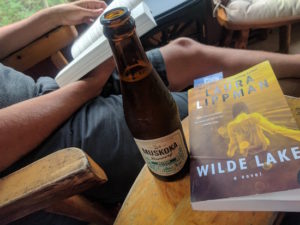 And next up to another woman writer who doesn’t get the credit for being as brilliant as she is, and that’s Laura Lippman—although she gets some credit. I’ve loved her work for years now, and was happy to read Wilde Lake, which I bought at Happenstance Books when I was there for the Lakefield Literary Festival. Stuart had already read it and couldn’t wait for me to finally get to it so we could talk about it. Loosely an homage to To Kill a Mockingbird, it’s about a newly elected State Attorney in Howard County, Maryland, who’s following in her revered father’s footsteps. When Lu’s first big murder case surprisingly hearkens back to events during the summer of 1980 during which her big-shot brother was involved in an altercation where somebody turned up dead, all kinds of long-forgotten secrets are brought up to the surface. This is a novel about rape culture, and the ways in which changes in the law have influenced how rapes are prosecuted, and it’s about fallibility, family secrets, and lost ideals, and I thought about it for days and days afterwards. It’s full of twists and surprises, and the most evocatively depicted small town, built around a lake, of course. It’s really an extraordinarily good novel.
And next up to another woman writer who doesn’t get the credit for being as brilliant as she is, and that’s Laura Lippman—although she gets some credit. I’ve loved her work for years now, and was happy to read Wilde Lake, which I bought at Happenstance Books when I was there for the Lakefield Literary Festival. Stuart had already read it and couldn’t wait for me to finally get to it so we could talk about it. Loosely an homage to To Kill a Mockingbird, it’s about a newly elected State Attorney in Howard County, Maryland, who’s following in her revered father’s footsteps. When Lu’s first big murder case surprisingly hearkens back to events during the summer of 1980 during which her big-shot brother was involved in an altercation where somebody turned up dead, all kinds of long-forgotten secrets are brought up to the surface. This is a novel about rape culture, and the ways in which changes in the law have influenced how rapes are prosecuted, and it’s about fallibility, family secrets, and lost ideals, and I thought about it for days and days afterwards. It’s full of twists and surprises, and the most evocatively depicted small town, built around a lake, of course. It’s really an extraordinarily good novel.
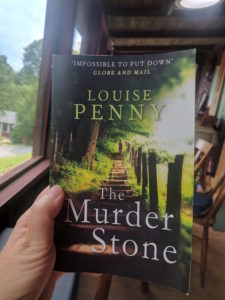 And then it was Friday and we were heading home the next day and the other book we’d bought was Bear Town, but Stuart was in the middle of it. And so I went to check out the library at the resort we were staying at, and was pleased to discover The Murder Stone, by Louise Penny (which was the UK title, published in Canada as A Rule Against Murder), which I haven’t read yet. (I came to Penny’s Three Pines series late with A Trick of the Light.) It was absolutely perfect to read because it was set at a place much like the place where were staying (albeit much much more fancy!) and as I was reading the part in the book where there was a huge storm with thunder and lightning, we were having the exact same weather and the lightning kept illuminating our little cabin just like daylight, and it was all a little too close to home.
And then it was Friday and we were heading home the next day and the other book we’d bought was Bear Town, but Stuart was in the middle of it. And so I went to check out the library at the resort we were staying at, and was pleased to discover The Murder Stone, by Louise Penny (which was the UK title, published in Canada as A Rule Against Murder), which I haven’t read yet. (I came to Penny’s Three Pines series late with A Trick of the Light.) It was absolutely perfect to read because it was set at a place much like the place where were staying (albeit much much more fancy!) and as I was reading the part in the book where there was a huge storm with thunder and lightning, we were having the exact same weather and the lightning kept illuminating our little cabin just like daylight, and it was all a little too close to home.
